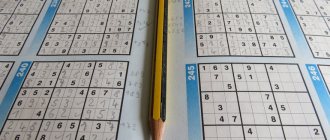It seems that this is running in a circle, and there is no way to escape from it - the base points on it may be different, but the essence is the same. Little time! A lot of nerves! Either you can’t get enough sleep, then you’re stuck at work, then the house is not in order, then you don’t pay enough attention to your loved ones, then you don’t pay enough attention to yourself... Stress! What to do? How to manage everything?
It is impossible to redo absolutely everything, despite self-organization. The time in the day is limited, our strength and nerves are also not unlimited. So let’s approach the issue practically. We need simple approaches that will help us organize our lives, minimize energy and time for necessary responsibilities, and prevent serious stress.
Create a family calendar
A work calendar is a common thing: it helps you remember deadlines and not miss meetings and business meetings. And in everyday life, we often forget to visit the doctor as planned or pay for kindergarten. Create a similar family calendar.
Write down the dates of school meetings, paying bills, meetings with friends and relatives, holidays, visits to the clinic and other things that are not related to work, but are no less important in life. You can hang the calendar on the wall or use mobile applications that remind you of the event in advance. The main thing is not to keep everything in your head.
Rules for effective time management
You can read about what time management is on our blog. In a nutshell, this is a set of time management techniques (from the English time and manage - “time” and “management”).
Below I will describe a step-by-step program for optimizing personal time. It consists of three stages, each of which has only 5 points. Take it on board and change your life for the better.
More than 100 cool lessons, tests and exercises for brain development
Start developing
Stage 1. Create healthy habits
Here we will correct our bad habits and develop useful ones.
- Early rise
Many books have been written about its benefits. For example, the author of the publication “Magic of the Morning,” Hal Elrod, is convinced that the first hour after waking up is the most important. And it is how we spend our morning that determines not only the success of the coming day, but also life in general.
Waking up early is not enough. The author focuses on the efficiency of time spent. Exercise, meditation, reading or planning will be useful. Even if you're a night owl, try getting up at least 10 minutes earlier than usual. After a week, you can increase the difference to 20 minutes, etc.
- Making a list for the day
What's the use of this? Firstly, you will have a clear action plan in front of you, which will help you concentrate and be less distracted. Secondly, the list will relieve your brain and you won’t have to keep everything in your head. And lastly, when you start crossing off completed tasks before going to bed, you will be able to feel that the day was not in vain.
- Order in everything
It's hard to concentrate on anything when there's chaos and chaos all around. Train yourself to delete unnecessary files on your phone and computer in a timely manner, to clean up your workplace, home, and car. This will not only improve your efficiency, but will also help you become more disciplined and organized.
- Solving problems as they arise
It happens that suddenly there is a need to solve unforeseen matters: visit a doctor, go to a car service center, call a plumber, make an urgent purchase. Don't snowball important tasks. Immediately add them to your list for the day or week and do everything on time.
- Reducing bad habits
We are talking about those things that steal our time. These are social networks, watching TV, spending five minutes in smoking rooms, playing games in mobile applications, etc. Once again, when we run away from the workplace to the coffee machine, we don’t want coffee, but to put things off. If the tasks on your list have not yet been crossed off, do not allow yourself to be distracted by empty activities.
Stage 2: Planning and prioritizing
Once we have developed good habits, it’s time to start managing our time.
- From complex to simple
Time management expert Brian Tracy likes to quote Mark Twain as an example: “If you ate a live frog every morning, you would spend the rest of the day with a slight feeling that the worst was over.” A frog in our case is some kind of big and complex matter. Perform it first when your concentration and efficiency are still at their maximum.
- The 20/80 principle
This principle is also called Pareto's law, after the Italian sociologist who developed it. Vilfredo Pareto argued that 80% of success comes from only 20% of effort. Other efforts turn out to be almost ineffective. Applicable to our topic, a recommendation might sound like this: when you are faced with a big task, evaluate what actions can lead to its solution, and select only the 20% of the most important ones. They are the ones who will bring you as close to the result as possible.
- Division into parts
When we see one big task, it causes us fear and doubt. Try breaking it down into small steps. Let's take learning a foreign language as an example. The idea that we need to memorize 3 English words today causes less resistance than the overall goal of learning 1,000 words in a year.
- Optimization of daily work
We all go grocery shopping, clean the apartment and perform other routine duties, spending precious minutes and hours on them. What if you plan them in such a way that it takes less time? For example, instead of spending 30 minutes every day going to the store, set aside one day a week for a big purchase. And to free up your day off from cleaning, tidy up your apartment every day for 5 minutes. Look for methods that are right for you.
- Following the Eisenhower Matrix
This is the most popular time management tool. Its essence is to divide your affairs into 4 categories: important urgent, important non-urgent, urgent unimportant and non-urgent unimportant. First of all, we carry out tasks with the highest priority (category “A” in the picture below), and then in descending order.
Stage 3. Work on efficiency
So, we have developed useful habits and learned to manage our time more efficiently. The final step is to increase your efficiency in completing tasks.
- Concentration on one thing
It has been scientifically proven that a man's brain cannot work productively on two tasks. And although women have greater opportunities in this regard, focusing on one thing is important regardless of gender. To do something efficiently and quickly, you should not be distracted by parallel tasks.
- Down with distractions
Many people see nothing wrong with working with the TV on in the background. In fact, this reduces efficiency significantly. Try not to be distracted by your smartphone or TV, then you can keep your concentration at maximum.
- Time limit
Scientists have proven that this technique allows the brain to work more efficiently. If you time yourself before performing a task, you can make sure that you complete it faster and with better quality.
- Reward and Praise
Finished important work on time? Great! Praise yourself and do something nice. In any business, motivation is very important. Train your brain that achievement always comes with a reward. Organize an evening watching your favorite TV series, buy the desired item, treat yourself to some goodies.
- Good rest = productivity
If you set yourself the task of being able to do everything everywhere, start working without breaks and days off, and be as concentrated and productive as possible, this will only lead to burnout. Rest is a vital part of effective work. Monitor the quality and timing of your sleep, breathe more fresh air and move.
I also recommend reading other time management techniques.
Plan your day
Plan your day hour by hour. Do the most important thing first, then do what is not so important, but also needs to be done. For the remaining time, schedule optional tasks.
Try to have no more than 9-10 tasks in total and no more than two large tasks in one day. Also leave at least one hour free in case of force majeure - suddenly you have to leave work urgently or one of the tasks will take longer.
Be realistic - just because you have a whole day ahead of you doesn't mean you can do everything you want. With a well-thought-out plan, you will get more done and will always be prepared for the unexpected.
Monitor your sleep patterns. Do something nice in the morning
Strictly follow your regime. Get up and go to bed at the same time. To wake up fresh and rested, the brain needs to go through certain stages of sleep. If your routine goes astray, you will feel sluggish, tired and irritable. In such a state, you definitely will not have the desire to work.
Find something to do in the morning that will make you wake up faster. Start the day with your favorite activity and then you will get into the work process faster. This could be a creative hobby or physical activity.
Make lists of big and small things to do
There are things that literally take 5-7 minutes: making a call, sorting out mail, checking something, or setting a task at work. But they are the ones that often take up time and are also easy to forget.
Make a special list of small tasks and open it whenever possible. For example, in a traffic jam, while cooking pasta, in line. So you will spend this short period of time usefully.
If you work at home, divide tasks into those that can be done simultaneously and those that require full inclusion. Do the first in parallel with cooking or when the child is playing with construction equipment, and the second - in the time allocated for work. For example, when the baby is under the reliable supervision of his grandmother or is sleeping.
Advice from psychologists
Let's look at what experts recommend to increase productivity at work and at home:
- As you remember, morning is an important element of a successful day. Stop reading news feeds. Better listen to music, do light exercises and eat a healthy breakfast.
- To improve brain function, use color therapy. Scientists have proven the influence of color on the psyche. Thus, red stimulates focus and leadership qualities, yellow promotes emotional involvement, orange is the color of optimists, green promotes harmony, blue promotes creativity.
- In addition to color, use aromatherapy. There are several types of essential oils that can stimulate brain activity. Try using citrus, eucalyptus, peppermint, and rosemary oils.
- Plan not only work, but also leisure. Just the thought of an upcoming vacation at sea can already improve your mood.
Ask for help
Do not hesitate to use the help of grandmothers, girlfriends, husband. Agree with your loved one about sharing household responsibilities. Hire a nanny or housekeeper if you cannot cope with household chores or caring for your baby. It is impossible to work effectively, cook 10 meals, clean the house to a speck and be an ideal mother.
Delegate what you can. Feel like you can't afford cleaning? Calculate how much an hour of your time is worth and decide which tasks you can hire an assistant for and which you will do yourself. It is also worth delegating the most annoying tasks that tire you and exhaust you.
Take care of your physical health. Find a creative hobby
If you don't feel well, you are unlikely to want to conquer the peaks.
People who are keen on running or swimming will confirm the fact that while playing sports they come up with solutions to previously unresolved issues. This is true. Even 10 minutes of physical activity is enough to trigger the body’s mechanisms for producing gamma-aminobutyric acid, an important neurotransmitter, the action of which reduces stress, which means it allows us to look at things from a different angle. Find the physical activity that you enjoy and make it a mandatory part of the weekend.
Creativity, whether it's the guitar, gardening or painting, allows you to disconnect from the everyday hustle and bustle. Even if you do not become famous as an artist, you will return to work rested, full of strength and energy.
Separate home and work
At work, do your work, and at home, do your family. Disconnect from work, devote yourself to your child and husband, relax, do not take work from the office for the evenings and weekends. The ability to concentrate on what you are doing at a particular moment greatly increases productivity. And children will be less distracted from work if they receive the right amount of attention.
Also on the topic: Why don’t you need to “burn” at work and overwork?
Three factors for forming a healthy habit
To get used to concentrating on the main thing, you need firmness, discipline and perseverance. All three qualities can be developed.
First , make a firm decision to develop the habit of completing any task.
Secondly , force yourself to exercise in a disciplined manner, repeating the techniques you are going to master over and over again until you bring them to automaticity.
Third , persevere until the habit takes root and becomes part of your personality.
Sit down, relax and imagine yourself from the outside, as if through the lens of a video camera. Imagine yourself in the future. Who you are? Where are you located and what do you do? What do you need to do in the present to bring this picture closer or change? Think about what qualities you have and what you need to improve. Any improvement in life begins with self-improvement. You have an unlimited ability to learn and develop new habits and skills. And having learned to immediately take on important work and see it through to completion, you will have to step up the gas - because now both your career and your whole life will rush along the fast track (Get out of your comfort zone. B. Tracy).
After conducting a study, psychologists at Stanford University came to the conclusion that work productivity (both professional and household) decreases if the work week lasts more than 50 hours. In other words, if you work 70 hours a week, this shows only one thing: you manage to get exactly as much done as more successful and organized people manage to do in 50.
But how to organize your time to get everything done? This question is asked by many women who are in a hurry to succeed in their careers and at home. We analyzed a number of psychological studies and identified the following key habits that are observed in successful people.
Enjoy the benefits of civilization
Don't go to a salon for a manicure - let the master come to your home. Don’t waste time shopping - now both clothes and food can be ordered online. Don't go to the bank or post office to pay utility bills. When buying a complex/expensive item, you can make a choice by reading the specifications and reviews online, and then quickly buy it at the nearest store. This way you won’t spend the whole day visiting retail outlets and comparing offers.
Use home gadgets that make cleaning, cooking and other household chores easier. Think about what applications, online stores and household appliances can save your time.
Where to find time for household chores
I'll tell you how to cope with your home routine without stress, spending less time on cleaning and cooking.
To avoid spending weekends cleaning, try to keep your home clean every day. It doesn’t take much time to put clothes in the closet, wipe down the stove after cooking, wash a couple of plates after eating, or sweep the floor in the hallway. All this is done in passing and does not require much effort.
Consider making your life easier with technology. A multicooker, a robot vacuum cleaner, a dishwasher - they will make it much easier and more enjoyable to cope with household chores.
Involve children in cleaning. Ask them to water the flowers, wipe the dust, clean their shoes, put away their things and toys. A small prize will be a great motivation, and working together will not only save time, but will also unite the whole family.
Semi-finished products will provide a good service in catering. They will save the situation in the event of an unexpected visit from guests, in the event of a late return home or poor health. If you're against store-bought fast food, make your own at home. For example, meat or vegetable cutlets, dumplings.
Use multitasking correctly
You can combine two tasks - one that requires attention, and one that can be done automatically. So, it’s easy to peel carrots and answer your child’s questions at the same time. But combining two similar activities that use the same area of the brain is not worth it. For example, talking to your husband and reading a work document.
You can also combine some tasks with what you do on a regular basis. For example, while walking with a stroller, listen to books in English and improve your language skills, and while your eldest son is studying in a circle, sort out work correspondence.
Learning to work in the conditions that you have here and now
A person can adapt to any circumstances and get used to anything. The main thing is to adequately assess the current situation and think about how you can work under its conditions. After all, you can get used to even constant noise. Or choose to work at a time when the children are guaranteed to sleep during a quiet hour.
For example, if you are the mother of a six-month-old baby and work remotely, place the child next to you. While he is busy looking at the surrounding space and crawling, devote time to work, while not forgetting to maintain visual contact with the baby.
Don't do unnecessary things
There are household chores that we do out of habit, and not because it is really important. For example, it is worth carefully ironing your baby’s things in the first month, until the umbilical wound has healed, and then there is no vital need for this. Not everyone irons their bed linen, washes the floors every day, or arranges things in their closets by color.
Think about what is really important and what you do only because it was accepted in your family. You can also simplify your life by buying furniture and clothes that are easier to care for, and discarding piles of unnecessary things that collect dust.
Listening to natural rhythms
Feel yourself, pay attention to natural rhythms. It is much easier for women to do this than for men. Nature itself has given us at least two bright clues: our monthly and lunar cycle. Our mood depends to some extent on both our personal and the lunar calendar.
Are you angry and irritated, or have no strength and want to cry? This often happens before “special days.” Monitor your emotions at different periods of your personal cycle.
Listen to your feelings. Are you full of energy and eager for great achievements? Are your feelings and emotions heightened and at their peak? Maybe it's a full moon today? Many people note the influence of the full moon on their emotional state. Find out what lunar day it is today - there is a lot of information on this matter on the Internet. Perhaps your observations and recommendations from the lunar calendar will give you the key to understanding your emotional and physical state, and this is the first step towards inner peace and harmony.
Leave time for yourself
You may fall into a common trap - scheduling work, time for children, husband and even friends. But don’t leave yourself time for relaxation and your favorite hobby. Many people forget to get proper rest and believe that it is more important to cope with the assigned tasks. And then they face emotional burnout and chronic fatigue. Include time for relaxation, self-care, and hobbies into your plan and try not to occupy it with things you didn’t have time to do.
Ekaterina Kushnir
Illustrations: Yulia Prososova
Recharging with morning energy
Morning is the best time to devote it to yourself and your activities. To do this, you need to learn to wake up a couple of hours earlier. This will help you not only recharge your batteries, but also redo things that are important to you, and set yourself up for a new productive day.
What is recommended to do in the early morning hours? Gymnastics, meditation, energy practices and other wellness procedures. In addition, you can use this time for those activities that you like: reading books, watching movies, hobbies, and so on. It is important that these things give you joy and vigor!
Washing children's clothes
Some parents claim that in nature there are children who never get stains on their clothes, fall into puddles, or tear their pants on tree branches. They talk a lot about such children, but no one has ever seen them. If you regularly deal with stains from paints, markers, fruit and soup, congratulations - you are the mother of a normal, living child! Therefore, if your child brought a “gift” from kindergarten, pour stain remover on this place immediately, and not a week later during washing.
Cheat: don’t skimp on children’s art supplies! The strokes of Chinese felt-tip pens wash off from children's clothes worse than marks from branded water-soluble ones. Cheap plasticine causes more trouble in cleaning and leaves nasty greasy stains on clothes, floors and furniture. Gouache washes off very poorly, so before dispensing paints, it’s worth taking off the young artist’s branded T-shirt.











